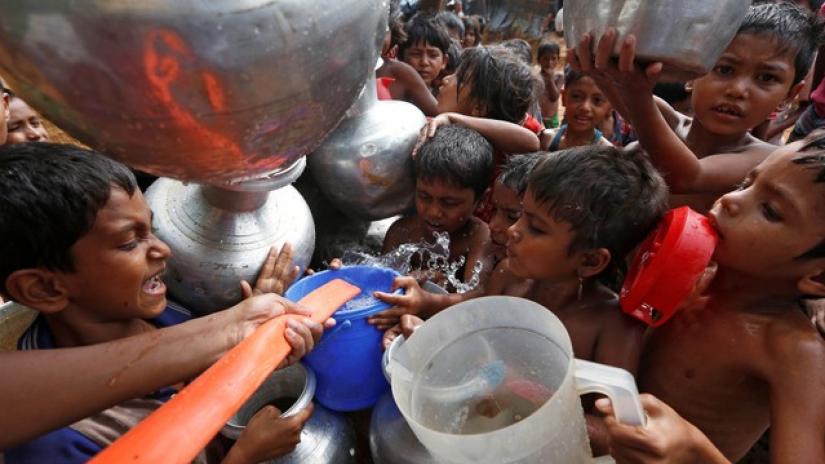 My family used to live inside Jhenidah Cadet College campus during the late-1960s and early 70s. The campus had its own water supply system. All the residents of the campus used get their water supply with from their overhead tanks for a fee. The water in those tanks used to flow from one big high-rise reservoir which used to receive its content from the underground natural reservoir. Since the water came from deep within the ground, we didn’t have to boil the water for drinking; it was safe. And we never experienced a water crisis during our 14-year stay in the campus.
My family used to live inside Jhenidah Cadet College campus during the late-1960s and early 70s. The campus had its own water supply system. All the residents of the campus used get their water supply with from their overhead tanks for a fee. The water in those tanks used to flow from one big high-rise reservoir which used to receive its content from the underground natural reservoir. Since the water came from deep within the ground, we didn’t have to boil the water for drinking; it was safe. And we never experienced a water crisis during our 14-year stay in the campus.
Despite the abundance of water, I never saw anybody wasting the valuable resource. The elders of that campus-community used to teach youngsters like us how not to waste water. Whenever I think of that time, I feel amazed that there was absolutely no water crisis in that campus, still the elders always taught us how to use the water wisely. I never had any idea that we can waste water.
However, it was during the early-70s, when I was a mere boy, I learned that as a society we waste a huge amount of water. We used to go to my Nanabari in Kushtia town every weekend. They had two tube-wells inside their home. They didn’t have any tap in their kitchen and shower rooms. Outside the house, there was an alternative water supply, a tap, which we used to call ‘tipkol’ provided and installed by the municipality authorities. There were many taps like that across the town.
Water flowed twice or thrice a day from those taps and the people living nearby used come and collect their water. If you pressed a knob, the water would flow. Unfortunately, none of the knobs of those taps were operational and when nobody was collecting water from the taps. I saw a huge amount of water would be wasted as nobody collected it. I had never seen those knobs working properly.
That was when I asked my father about it. He told me that nobody bothered to fix the knobs. I don’t why, but observing water being wasted had a deep impact on me about using this valuable resource. I became more cautious about using water. When we came to Dhaka in the mid-‘80s, I observed a festival of wasting water resources. Nobody had any kind of awareness that the flow of water isn’t limitless. It would end one day. Everybody was wasting water; everybody was using more water that it is required in a person’s life. This was the time when we also started polluting our rivers across the country, especially around Dhaka city.
When we came to Dhaka in the mid-‘80s, I observed a festival of wasting water resources. Nobody had any kind of awareness that the flow of water isn’t limitless. It would end one day. Everybody was wasting water; everybody was using more water that it is required in a person’s life. This was the time when we also started polluting our rivers across the country, especially around Dhaka city.
Years after that, now, I believe the state of the affairs on our water front has come to such a level that it would be difficult to save us without the emergency action plans. Our behavior — consciously and ignorantly — has done two kinds of harm. We have industrially destroyed the rivers, one of prime sources of water both for irrigation as well as human use. Secondly, we’re now finishing off our underground water reserves by overusing them for human consumption and agriculture.
Apart from our habit and behaviour, the technologies that we use in the entire supply system are not meant for using water wisely. Rather, they are meant for overuse of water. In irrigation, we don’t follow the scientific ways of using water as many countries have been doing. It is the same in our everyday life; we are using more than we require without thinking of the future crisis in water availability. The supply network is so faulty that a huge amount of water is being wasted every minute.
On the other hand, countries around the world have already discovered many smart ways of using water resources. I suppose, alongside being economically wise, they have also understood the critical importance of this magical natural resource. They have implemented various kinds of technologies so that water is distributed and used wisely. In many countries, the internet of things (IoT) is maintaining the distribution system.
The use of IoT sensor-based water management has led many to save, preserve and use water intelligently. Bangladesh has already implemented 4G technology. By using the internet which is the base for the sensors to work, we should go for a well thought-out water management plan and implement it.
The time has come for us to ask ourselves whether we — individually, in our buildings and houses and as a nation collectively — are using the water available to us efficiently; otherwise there will be nothing to do when we run out of water. We must remember that the whole Africa is suffering due to water crisis. Hundreds of cities in India are about to run out of water because they didn’t act wisely.
Ekram Kabir is a storyteller. His works can be found on ekramkabir.com.


